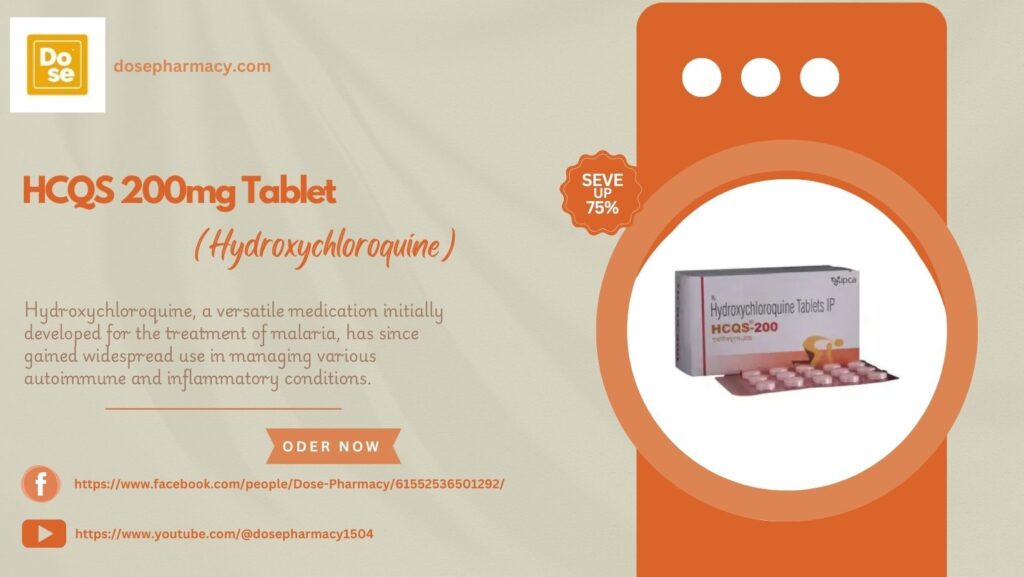
Hcqs 200 is a well-known medication used to treat a variety of autoimmune and infectious diseases. Whether prescribed for lupus, rheumatoid arthritis, or malaria, one question that frequently arises is:
“How long is it safe to stay on hydroxychloroquine?”
The answer depends on several factors including your condition, dosage, response to treatment, and overall health. In this article, we’ll explore the typical treatment durations, long-term safety, risks, and what patients need to know about staying on hydroxychloroquine for months or even years.
What Is Hydroxychloroquine?
Hydroxychloroquine is an antimalarial drug that also possesses immunomodulatory effects. It was initially used to prevent and treat malaria, but today, it is most commonly prescribed for autoimmune diseases such as:
-
Systemic Lupus Erythematosus (SLE)
-
Rheumatoid Arthritis (RA)
-
Sjogren’s Syndrome
-
Dermatomyositis
Hydroxychloroquine works by dampening overactive immune responses, reducing inflammation, and preventing disease flare-ups.
How Long Do People Usually Take Hydroxychloroquine?
✅ Short-Term Use (Weeks to Months)
For malaria, hydroxychloroquine is typically used for a short duration, often just a few days to a few weeks. You can also buy hydroxychloroquine online from dosepharmacy. In travel medicine, it’s also used prophylactically (for prevention) before, during, and shortly after visiting a malaria-endemic region.
✅ Long-Term Use (Months to Years)
For chronic autoimmune conditions, hydroxychloroquine is usually prescribed for long-term use, sometimes indefinitely. Here are common timelines:
-
Lupus: Many patients stay on hydroxychloroquine for years or lifelong, as it helps reduce disease activity, prevent flare-ups, and protect internal organs.
-
Rheumatoid Arthritis: Patients may use hydroxychloroquine as part of a long-term disease-modifying regimen, especially in early or mild cases.
-
Maintenance Therapy: Even if symptoms improve, doctors often recommend continuing treatment to prevent relapses.
Is It Safe to Take Hydroxychloroquine Long-Term?
Yes — in most cases, hydroxychloroquine is safe for long-term use, especially when taken at the correct dose and monitored appropriately.
It is generally well-tolerated, with fewer side effects compared to many other immunosuppressive or anti-rheumatic drugs. However, prolonged use does come with some risks, the most concerning of which is retinal toxicity.
Understanding Retinal Toxicity
🔍 What Is Retinal Toxicity?
Retinal toxicity occurs when hydroxychloroquine causes damage to the retina, particularly the macula, which is responsible for central vision. If left undetected, it can lead to permanent vision loss.
🧠 Key Risk Factors:
-
High daily doses (more than 5 mg/kg of actual body weight)
-
Use for more than 5 years
-
Kidney impairment
-
Older age (60+)
-
Concurrent retinal disease
👁️ How Common Is It?
According to the American Academy of Ophthalmology (AAO):
-
Retinal toxicity is rare in the first 5 years of use.
-
Risk increases after 5–10 years, especially at higher doses.
How to Use Hydroxychloroquine Safely Long-Term
1. Stick to the Recommended Dose
The safe daily dose is generally not more than 5 mg/kg of actual body weight. For example, if you weigh 60 kg, your dose should not exceed 300 mg daily.
Many tablets come in 200 mg increments, and your doctor may alternate dosing days to keep within safe limits.
2. Schedule Regular Eye Exams
-
A baseline eye exam is recommended within the first year of starting hydroxychloroquine.
-
After 5 years of continuous use, annual eye exams with specialized retinal imaging (OCT, visual field testing) are crucial.
Early detection of eye changes can help prevent vision loss and guide whether the medication should be continued or discontinued.
3. Monitor Liver and Kidney Function
Because hydroxychloroquine is metabolized and excreted by the liver and kidneys, regular blood tests are important, especially in older adults or those with pre-existing conditions.
4. Report Any Vision Changes Immediately
If you experience blurry vision, trouble focusing, or changes in color perception, contact your doctor immediately.
When Should You Stop Taking Hydroxychloroquine?
You may need to stop or reconsider hydroxychloroquine if:
-
You develop retinal damage or toxicity
-
You experience severe allergic reactions
-
Your condition goes into sustained remission
-
You develop liver or kidney complications
Discontinuation should always be done under medical supervision. Stopping abruptly without guidance may trigger disease flares.
Are There Alternatives to Long-Term Hydroxychloroquine?
Yes. Depending on your condition and how you respond to treatment, your doctor may consider:
-
Methotrexate
-
Azathioprine
-
Biologic drugs (like adalimumab or rituximab)
-
Corticosteroids (short-term)
However, hydroxychloroquine is often preferred as a first-line agent due to its favorable safety profile and oral convenience.
Frequently Asked Questions
❓ Can I take hydroxychloroquine for life?
Yes, many patients with lupus or rheumatoid arthritis remain on hydroxychloroquine for 10 years or more, provided they are regularly monitored and show no signs of toxicity.
❓ Does stopping hydroxychloroquine suddenly cause problems?
While it’s not dangerous like some drugs that require tapering, stopping hydroxychloroquine abruptly may lead to disease flares, especially in lupus. Always consult your doctor first.
❓ Can I reduce my dose over time?
If your disease is well-controlled, your doctor may recommend dose adjustments or even a trial discontinuation. However, this is evaluated on a case-by-case basis.
Hydroxychloroquine is one of the safest and most effective medications for treating autoimmune diseases like lupus and rheumatoid arthritis. For many patients, long-term or even lifelong use is both necessary and beneficial.
While retinal toxicity is a valid concern, regular monitoring, proper dosing, and good communication with your healthcare provider can minimize the risks and help you stay on hydroxychloroquine safely for years.
If you’re currently taking or considering hydroxychloroquine, work closely with your doctor to create a plan that balances efficacy and safety, ensuring the best long-term outcomes for your health.




